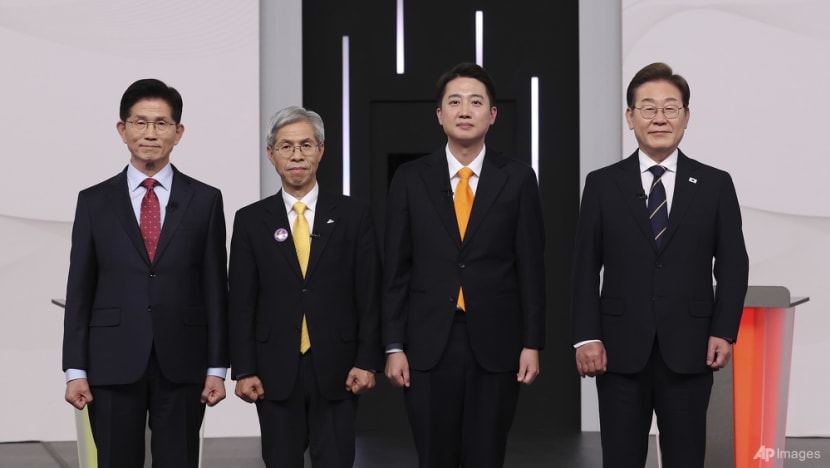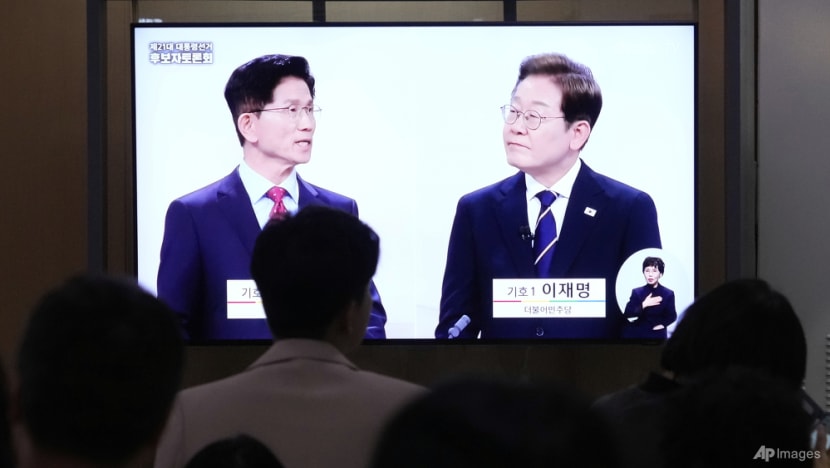South Korea's presidential candidates face off in fiery debate

From left to right: South Korea's presidential candidates, Kim Moon Soo of the People Power Party, Kwon Young-guk of the Democratic Labor Party, Lee Jun-seok of the New Reform Party and Lee Jae-myung of the Democratic Party pose ahead of a televised presidential debate at SBS studio in Seoul, on May 18, 2025. (Photo: AP/Chung Sung-Jun)
SEOUL: South Korea's presidential candidates faced off in a heated first TV debate on Sunday (May 18) evening, ahead of a snap election on Jun 3 to choose a successor to former President Yoon Suk Yeol who was impeached over his short-lived martial law declaration in December.
Lee Jae-myung, the main opposition Democratic Party's candidate and the frontrunner in the race, has faced criticism from opponents as being too friendly to China, citing his comments that South Korea does not need to get involved in China-Taiwan disputes.
But Lee, who considers pragmatism as key to his foreign policy, said the country "should not go all-in" on its alliance with Washington, and said managing China and Russia relations was important, although security cooperation with the United States and Japan is necessary.
He also advocated more investment in artificial intelligence, protection for unionised workers, a four-and-a-half-day working week and putting South Korea's interests first in responding to US tariffs.
There was no need for Seoul to rush to reach a trade agreement with Washington, Lee said during the two-hour debate.
"I think we should prepare well for this situation delicately and competently," Lee added, also arguing South Korea needs to nurture high-tech and renewable energy industries to overcome low economic growth.
"We will focus on developing so-called sovereign AI so our people can at least use something like ChatGPT for free like an electronic calculator," he said.
Kim Moon-soo, candidate for the conservative People Power Party, vowed to create jobs and deregulate to foster businesses.
POLITICAL TURMOIL
Asia's fourth-largest economy contracted in the first quarter as exports and consumption stalled, amid fears over the impact of Washington's aggressive tariffs and political turmoil at home.
South Korea has begun trade talks with the US and is seeking a waiver from the tariffs. US President Donald Trump slapped 25 per cent tariffs on South Korea in April, after which Seoul was one of the first countries to hold face-to-face talks with Washington, following in the footsteps of Japan.
Lee has vowed to raise AI investment to 100 trillion won (US$71.5 billion) and offer a production tax credit of up to 10 per cent for semiconductors manufactured and sold domestically.
Kim has pledged to create a government agency dedicated to innovating regulations and to invest more than 5 per cent of the budget in research and development.
Lee holds a lead with 51 per cent support in the latest Gallup Korea poll released on Friday, with Kim trailing far behind at 29 per cent.

Former President Yoon was ousted last month over his short-lived imposition of martial law on Dec 3, stoking political turmoil and triggering the election.
Lee called earlier in the day for constitutional reform to allow a four-year, two-term presidency and a two-round system for presidential elections through a referendum.
South Korean presidents currently serve a single five-year term.
He also vowed to curb the presidential right to declare martial law and hold to account those responsible for the Dec 3 declaration.
"We must gather the people's strength to root (them) out and strictly hold (them) accountable," he told a press briefing.
















